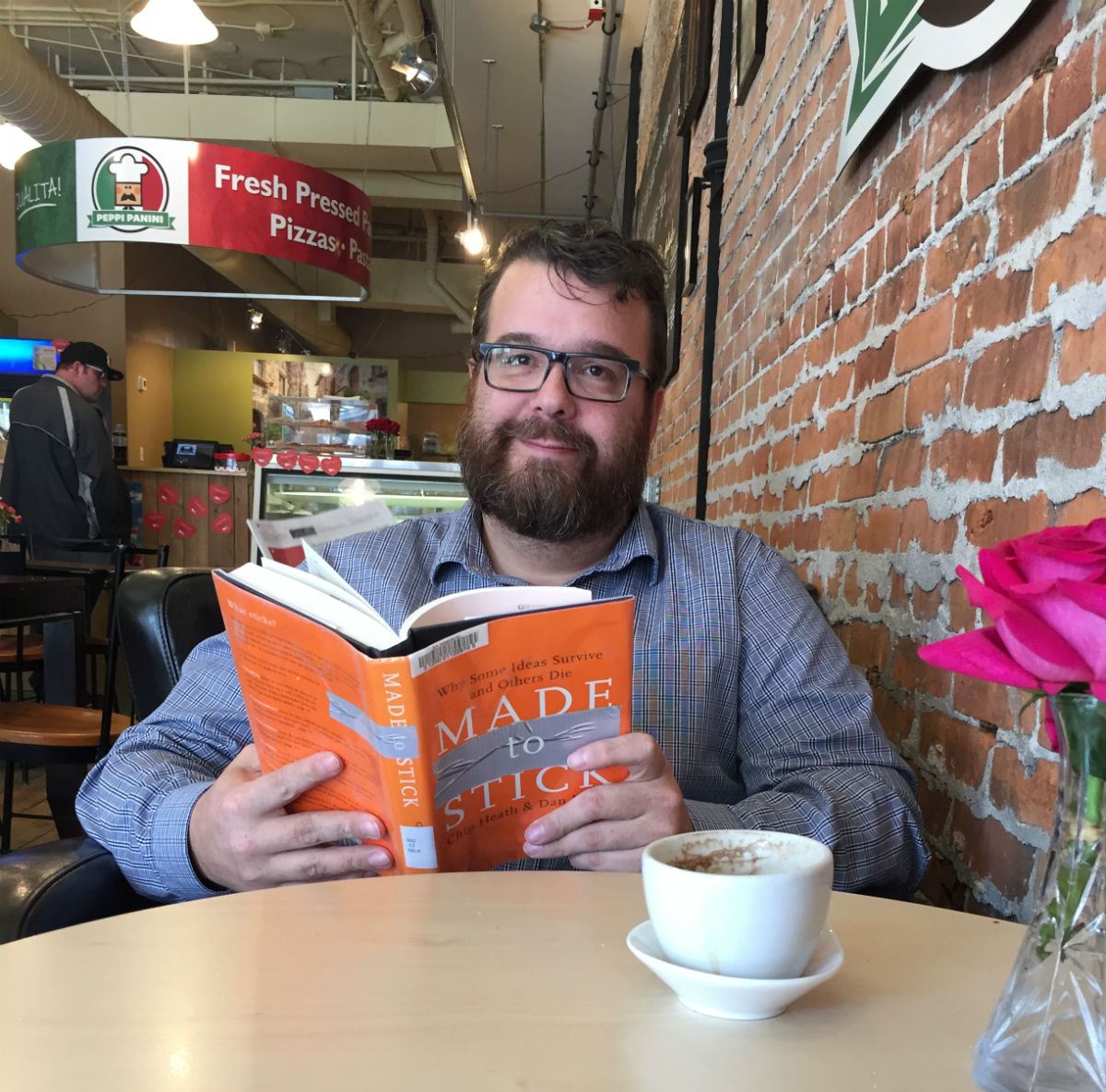BOOK TALK WITH GSPL: JEFF MACINTYRE

Jeff MacIntyre is the Marketing Director at Fuel Multimedia and is currently Chair of the Downtown Sudbury Board of Directors. As a reader, Jeff is much more interested in non-fiction books than fiction and has a list of many that have influenced his life. He reads in spurts and while he might go a year not reading any books, he might then read four all in one month. It really boils down to how busy life gets and how sometimes he needs to challenge himself and his ideas and consider other viewpoints – which is something he is able to do through reading books.
Were you always a reader?
I didn’t like reading for long time. It was mostly because I was made to read certain things in school and I always had a hard time with fiction – I just don’t associate with fictional stories. I like biographies and historical stories. Sometimes there is the odd fictional book that I do enjoy, but it is generally stuff that has absolutely no reality to it. Animal Farm by George Orwell is the first book I remember liking; it was far enough from reality but a commentary of reality that made me like it. When people create fictional stories I have always had a hard time falling in love with the characters. I’m the person who points out plot errors when I watch movies and will always catch the parts that don’t work which cause the plot to fall apart.
My grandmother was the one who got me into books I actually enjoyed reading. She would have books lying around when I would go over at lunch. She taught me to argue and I had to read books to keep up with her. I have an excess of need for logic in things which is weird since I’m in a creative profession. I like to surround myself with creative people because l like to connect to people that have different viewpoints than I have so putting myself into a creative business has always allowed me to explore that side of myself.
What do you like to read?
I like reading stuff I disagree with. Those kinds of book won’t necessary make my top list of books but I am fascinated by how others form opinions. I may have an unhealthy fascination with that. When things don’t go my way, when the world disagrees with me, I like examining why. What is it that makes us look at the same thing differently? When you better understand varying opinions it changes how you start to think about the word.
What is the first non-fiction book you read that really got you thinking?
Boom Bust Echo by David Foot got me looking at the world in a different way. It is a book about demographics. The writer did a good job explaining how the world shifts and moves and how things that are thought to be popular really depends on who exists in the world at the time. This book was originally written about the baby boomer generation and looked at how that population was going to shift how the world would work. This was the first time I understood that somebody’s life experience changes how they see the world. It helped me understand that someone older than me would look at a particular situation and experience it differently.
What is a book you think more people should read?
I actually listened to 10% Happier: How I Tamed the Voice in My Head, Reduced Stress Without Losing My Edge, and Found Self-help That Actually Works – a True Story by Dan Harris as an audiobook first, and the author has really a compelling voice. Then I read the book a second time because it is such an entertaining read. The author has interviewed many religious, cult, and spiritual leaders and was looking for a way to be happier in life. He wasn’t very religious himself but there was stuff each of these various spiritual people said that resonated with him, and he took pieces of those things and ended up getting into meditation. I had been playing with meditation myself so it resonated with me. It was really interesting to see so many different religions of the world have all these commonalities about things like why its important to centre yourself, examine your thoughts, that kind of thing. Harris really is the funniest writer I have ever read. He is a Muppets fan and is king of the running joke – some of the jokes that go through the book I really appreciate.
Is there a book that has affected the work that you do?
There is a book that feeds into my love of marketing and it is Made to Stick: Why Some Ideas Survive and Others Die by Chip Heath. This is an exploration of why some ideas stick around and the author goes back to a lot of myths and old wives tales that people hold onto and why they become so endearing as part of a culture. Things like why you can have a saying that lives forever; what makes these things last. Something like “a penny earned is a penny saved”. Being a marketer, this idea is important and looking at it in depth in terms of looking at how to make ideas stick with people is something I really appreciate. The unique way the author presents it also makes it very entertaining and readable.
Is there a book you have read that relates to the political world you engage in?
Predictably Irrational: The Hidden Forces That Shape Our Decisions by Dan Ariely, is a book that brings things full circle for me. While Boom Bust Echo was the first book to help me understand why people see things differently, this book helped show me why people can make bad choices consistently. It helps explain why someone might view an idea and think it’s a good idea when really it probably isn’t. It goes back to the evolution of people and how it is safer to be scared of a lion in the jungle then to ignore the little rustle in the bush. It looks at why terms like free are more important than they should be in our culture. Anyone that wants to get into public office, or deals with a large scope of people, should read this book because it helps shed light on why sometimes fiction seems more believable than fact. It helps explain Trump before Trump existed.
What is a book that has changed the way you think?
How Not to Be Wrong: The Power of Mathematical Thinking by Jordan Ellenberg is a book about statistics and it sounds like it should be really dull because of that but it is super easy to read and talks about what is going on in the world and how sometimes it can be framed in a way that is totally deceptive. For instance, you can look at polling data in an election and see it as wrong if the person you hoped to win didn’t. When statistics show that something will happen and then it doesn’t, it’s the 1 in 10 times that they should have been wrong. This book helps you understand how stats should be written and what inherent biases you have when you hear numbers. When we look at a disaster that takes place in one place in the world, we really can’t compare that situation to how it might happen in a place like Sudbury, it is just not relatable. We need to put things into perspective to have a better understanding on why things are important.
Recommended Posts

BLOOM ARTIST PROFILE: EYEDA SOPHIA
March 01, 2020

MAKING OF A DEBUT EP WITH MAX JOSÉ
February 11, 2020

WORDSTOCK SUDBURY HAS ARRIVED!
November 01, 2019

